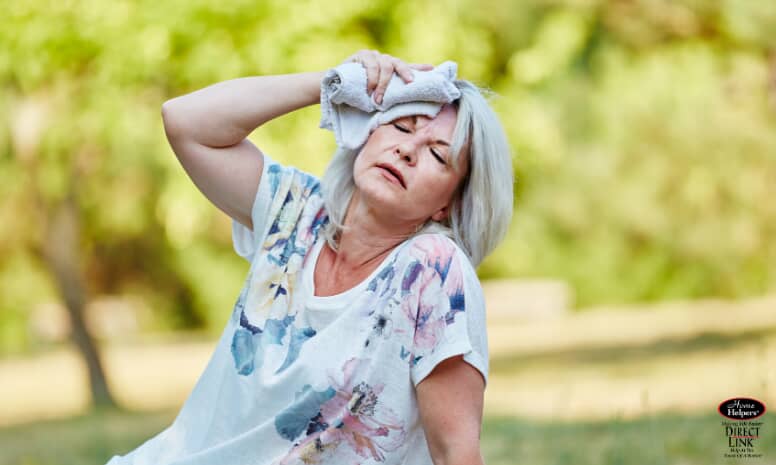Dr. Marshall L. Cook said it best in his book, Growing Old is Not for Sissies, because aging takes a toll on men and women over the age of 65, physically, mentally, emotionally and spiritually.
From a physical standpoint, seniors living in Florida must exercise an abundance of caution in the summer months, thanks to our consistently hot, humid, tropical climate. I mean, they don’t call Florida the Sunshine State for nothing!
One of the resources I regularly reference for timely information pertaining to seniors is DailyCaring. In a recent publication, the author said, “36% of heat-related deaths in the United States were among people over age 65.”
It’s difficult for older bodies to recognize changes in temperature and adjust to these changes, so older individuals may not even notice they are becoming too hot, until symptoms arise. If seniors become too hot, hyperthermia –body temperature rises greatly above normal – can result in dire consequences.
The symptoms of hyperthermia are:
- Headache
- Dizziness
- Confusion, agitation, or disorientation
- Fatigue
- Muscle cramps
- Hot, dry skin that is flushed but not sweaty
- Fever
- Loss of consciousness
- Rapid heart beat
- Hallucinations
- Vomiting
Moreover, certain medications, like beta blockers prescribed for high blood pressure, can complicate matters, and delay or inhibit the body’s ability to respond to heat.
The National Institute on Health [NIH] explained, “As we age, our ability to adequately respond to summer heat can become a serious problem. … Hyperthermia can include heat stroke, heat edema (swelling in your ankles and feet when you get hot), heat syncope (sudden dizziness after exercising in the heat), heat cramps and heat exhaustion.”
The NIH lists several factors that could increase your risk of experiencing heat-related conditions:
- Age-related changes to the skin, such as poor blood circulation and inefficient sweat glands
- Heart, lung and kidney diseases, as well as any illness that causes general weakness or fever
- High blood pressure or other conditions that require changes in diet, such as salt-restricted diets
- Reduced sweating, caused by medications such as diuretics, sedatives, tranquilizers, and certain heart and blood pressure drugs
- Taking several drugs for various conditions
- Being substantially overweight or underweight
- Drinking alcoholic beverages
- Being dehydrated
Since risk factors exist in most seniors, and their vulnerability to heat-related conditions is a given, a discussion is warranted about 10 ways seniors can stay cool this summer to prevent hyperthermia:
- STAY HYDRATED! Drink plenty of water throughout the day, not just when thirst strikes, and avoid alcohol and caffeine. Remember, if your urine is dark yellow, you're probably not drinking enough liquids.
- Eat cooling snacks. Homemade or store-bought popsicles are a tasty way to stay cool and hydrated. Use cupcake liners to catch drips).
- Eat light, cold meals. Cold chicken and numerous varieties of salad are lighter and more nutritious than a pot roast.
- Use cool towels. Apply a cool cloth on the back of the neck, and rinse periodically to improve cooling.
- Soak your feet. Sit with feet in a pan of cool water. That’s cool, not cold water!
- Bathe. No need for a cold shower, but prep water to be just below your body temperature and take a warm shower, immersion or sponge bath.
- Keep home cool. Use the air conditioner for cool comfort at home, and close window shades or blinds to block the hot sun rays.
- Wear lightweight clothes. Loose, light-colored clothing won't absorb so much heat, and if worn in layers, they can be added or removed for personal comfort.
- Visit cool locations. When it is safe for seniors to go out, malls, libraries, and coffee shops offer cool respite from scorching heat.
- Plan around peak hours. If you plan to exercise or work in the sun, be sure to do it in the cooler part of the day, before 10 a.m. or after 4 p.m. Take it easy on hot days.
If you notice any of the symptoms listed earlier in this blog, and suspect a senior is suffering from heat exhaustion or heat stroke, provide immediate help by:
- Calling 911 – Time matters and minutes count!
- Bringing the person out of the heat and into a shady, air-conditioned, or cooler place, and encouraging them to lie down and elevate their feet.
- Bringing them fluids such as water and fruit or vegetable juices, if they can swallow properly. NO alcohol or caffeine!
- Applying a cold, wet cloth to their wrists, neck, armpits and groin.
- Encouraging the person to shower, bathe or sponge-off with cool water, if it is safe to do so
These suggestions may prove challenging for seniors living alone, so I recommend a highly-skilled caregiver to provide assistance with personal care, to monitor their physical well-being, and companion care to curb feelings of isolation, loneliness and depression that negatively impact mental health. I gladly offer a FREE consultation to assess all needs and match the perfect, most qualified caregiver to help when the heat is on!
We, at Home Helpers® Clearwater, are honored to have received the Home Care Pulse – Best of Home Care® Provider of Choice Award for 2017, 2018, 2019 & 2020. We proudly serve male and female seniors in Clearwater, Dunedin, Palm Harbor, Safety Harbor, Tarpon Springs, Holiday, New Port Richey, Trinity, Port Richey, Hudson and surrounding areas. Home Helpers®…we are Making Life Easier℠ (727) 240-3059
Source:

